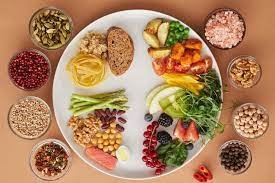Best Healthy eating habits is the cornerstone of a vibrant, energetic life. It’s not just about counting calories or following the latest fad diet; rather, it’s a sustainable approach that nourishes your body with essential nutrients, supports overall well-being, and reduces the risk of chronic diseases. As a fitness trainer dedicated to holistic health, I emphasize the importance of adopting healthier eating habits that promote longevity and vitality. Let’s delve deeper into eight essential tips to guide you on your journey towards a healthier lifestyle:
Base Your Meals on Higher Fiber Starchy Carbohydrates:
Start your day with whole grains like oats or whole wheat toast, which provide sustained energy and essential nutrients like fiber, B vitamins, and minerals. Include starchy vegetables such as sweet potatoes, which are rich in vitamins A and C, and complex carbohydrates that help regulate blood sugar levels.
Eat Lots of Fruits and Vegetables:
Aim to include a variety of colorful fruits and vegetables in your daily meals. These foods are low in calories and high in vitamins, minerals, antioxidants, and fiber, which support immune function, promote healthy digestion, and reduce the risk of chronic diseases like heart disease and certain cancers.
Include More Fish, Especially Oily Fish:
Incorporate oily fish such as salmon, trout, and sardines into your diet at least twice a week. These fish are rich in omega-3 fatty acids EPA and DHA, which are essential for brain health, heart health, and reducing inflammation throughout the body. If you’re vegetarian or vegan, consider sources of plant-based omega-3s like flaxseeds, chia seeds, and walnuts.
Choose Lean Protein Sources:
Opt for lean protein sources such as poultry (skinless chicken or turkey), beans, legumes (like lentils and chickpeas), tofu, and lean cuts of meat like sirloin or tenderloin. Protein is essential for muscle repair, growth, and overall cellular function, without the excess saturated fats found in fatty cuts of meat.
Replace Saturated Fats with Healthier Fats:
Replace saturated fats found in butter, cheese, and fatty meats with healthier fats like those found in avocados, nuts (such as almonds, walnuts, and pistachios), seeds (like chia and flax seeds), and olive oil. These unsaturated fats support heart health, lower LDL (bad) cholesterol levels, and provide essential fatty acids that the body cannot produce on its own.
Limit Added Sugars and Sweets:
Reduce your intake of added sugars from sugary beverages (like soda and energy drinks), candies, desserts, and processed foods. Choose natural sources of sweetness such as fresh fruits or small amounts of honey or maple syrup when needed. High sugar intake can contribute to weight gain, dental issues, and increased risk of chronic diseases like type 2 diabetes and cardiovascular disease.
Reduce Salt Intake:
Lower your sodium intake by choosing fresh foods over processed ones whenever possible. When seasoning your meals, use herbs, spices, lemon juice, or vinegar instead of salt to enhance flavor. Excess sodium consumption can lead to high blood pressure, which increases the risk of stroke, heart disease, and kidney problems.
Stay Hydrated with Water:
Drink plenty of water throughout the day to maintain hydration and support optimal bodily functions. Aim for at least eight glasses (about 2 liters) of water daily, adjusting based on your activity level, climate, and individual needs. Herbal teas and infused water can add variety and hydration without additional calories or sugars found in many other beverages.
Practice Portion Control:
Be mindful of portion sizes by using smaller plates and bowls to avoid overeating. Pay attention to your body’s hunger and fullness cues, eating slowly and savoring each bite. Avoid distractions like screens during meals to focus on your food and prevent mindless eating. Portion control is key to maintaining a healthy weight and promoting better digestion system.
Prioritize Nutrient Density:
Choose right foods that are nutrient-dense, meaning they provide a high amount of vitamins, minerals, and antioxidants relative to their calorie content. Focus on whole, unprocessed foods such as fresh fruits and vegetables, whole grains, lean proteins, and healthy fats. These Best healthy eating habits not only nourish your body but also support optimal health, energy levels, and overall well-being.
Conclusion
Embracing Best healthy eating habits isn’t just a short-term fix—it’s a lifestyle choice that can transform your life. By incorporating these eight tips into your daily routine, you’re not only improving your physical health but also enhancing your mental well-being and quality of life. Remember, every positive change you make contributes to your long-term health goals. Stay committed, stay informed, and prioritize your health—it’s the foundation for a happier, healthy lifestyle for you.



